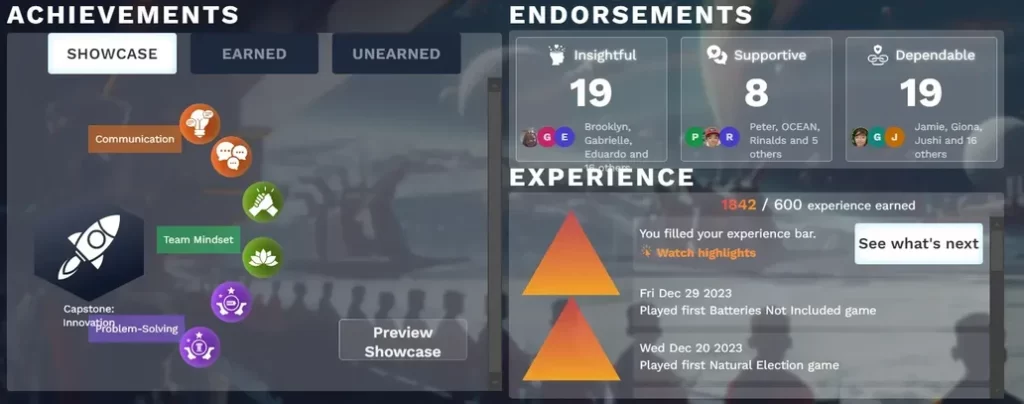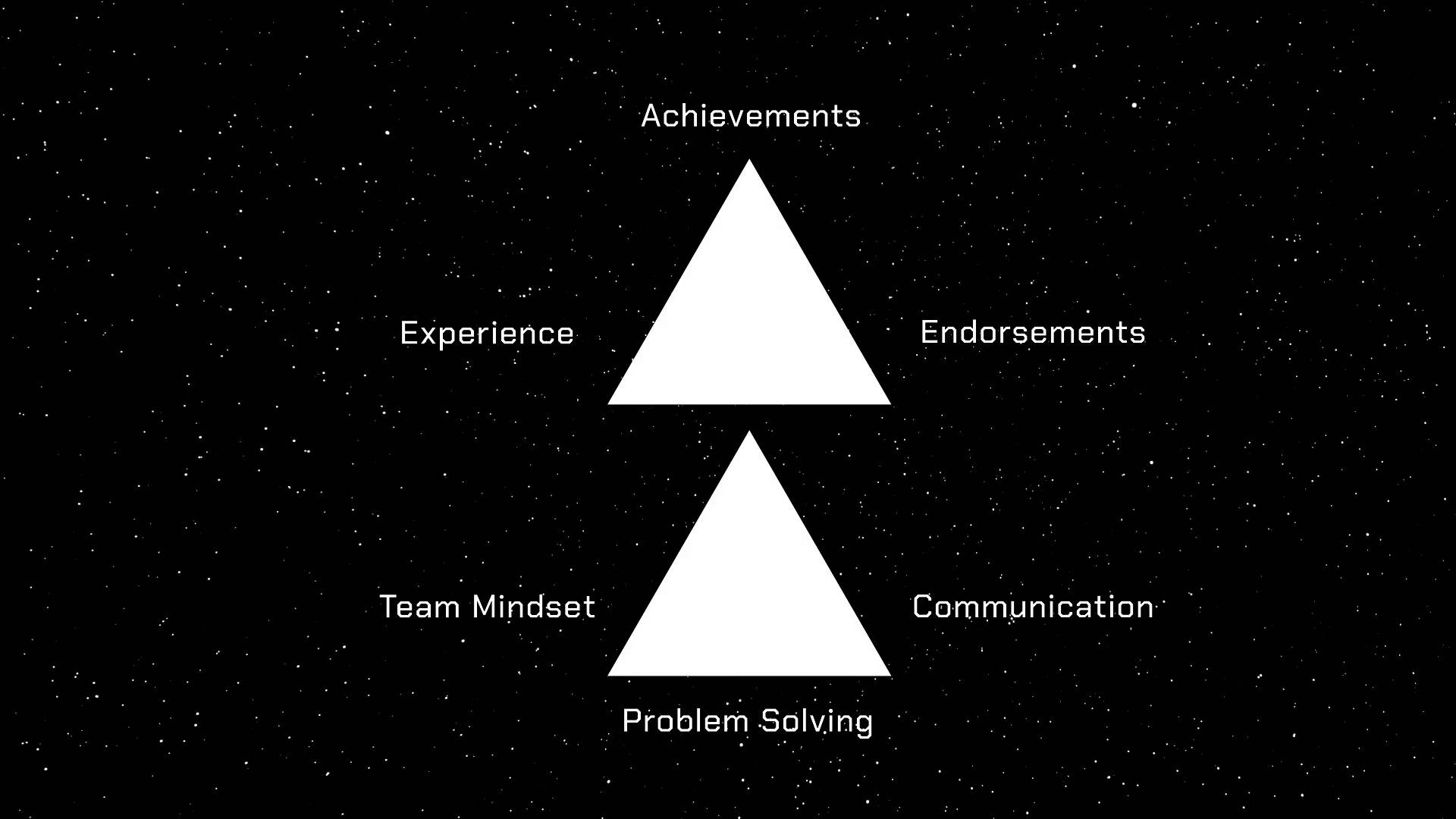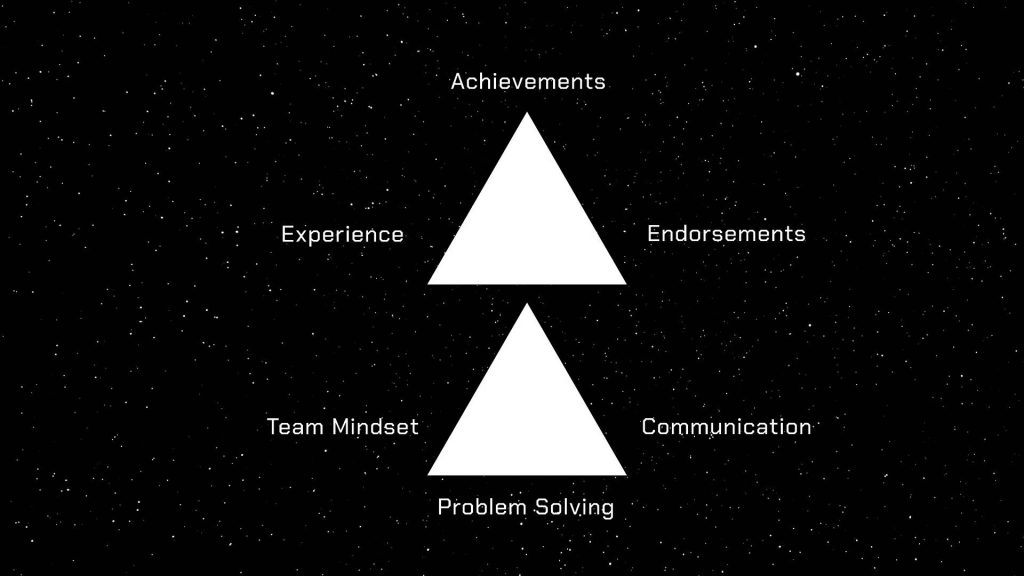成长档案:Synthesis
学生的进步之路
【家长指南】
目标:参与 Synthesis 游戏…并取得胜利
我们了解学生选择Synthesis的原因:为了掌握生活中最重要的技能——如何在团队中解决复杂问题。我们也知道这些技能是如何习得的:通过参与团队思维游戏,并在睿智且友好的教练指导下完成任务。
然而,目前缺少的是一张“路线图”:Synthesis的最终目标是什么?我怎么知道自己已经达到了目标?完成课程后能得到什么?如何才能“赢得”Synthesis?
成长档案是Synthesis学生自我创建的个人档案,它提供了一个结构化的进步路径,包括一个明确且真实的最终目标。想要“赢得”Synthesis并不容易。成为超级协作者类似于成为问题解决领域的“鹰级童子军”或合作领域的“黑带”。但对于那些致力于挑战的学生,我们将随时准备提供支持。
成为超级协作者:三大支柱
超级协作者的思维、行为和沟通方式有三个主要支柱:沟通、团队心态和问题解决。
1. 沟通(技能与风格)
- 沟通技能: 鼓励他人、积极倾听、积极参与、简洁表达、帮助他人、解决冲突。
- 沟通风格: 友好、自信、清晰、理解他人。
2. 团队心态(成为优秀队友的特质)
- 责任感、坚持、好奇心、专注、可靠性、一致性、适应新团队与多样化团队成员的能力、尊重他人姓名发音、适应新团队技能水平的灵活性。
3. 问题解决(思维模式+批判性思维技能)
- 对新挑战充满灵感、适应新环境、追求问题根源、二阶思维、从整体角度看待问题、有洞察力、设定目标、适应新情境、必要时灵活调整。
成长档案:学生的进步方式

在Synthesis中,学生通过上述技能的实践获得经验。他们有机会通过成就证明自己的能力,而这些成就将由学生策划,汇总到成长档案中,并在一对一面试中进行展示和答辩。
📖经验
学生需要通过持续的练习来发展上述技能,就像学习音乐或体育技能一样。他们通过游戏环节、讨论环节以及里程碑(例如第一次玩Proxima、参加20次讨论)获得经验。
🎖️成就
成就展示学生在以上三大支柱中的能力。随着经验的增加,更多的成就将被解锁。但成就不是累积游戏,学生无需“获取所有成就”。相反,他们将精选最具意义的成就,展示每个支柱中的两个最佳,讲述他们成为超级协作者的旅程。
成就分为两类:
- 系统成就: 自动获得,无需反思。
例:赢得“专家级挑战”会自动授予“专家挑战”成就。 - 反思成就: 需要撰写反思,并由教练评估后授予。
例:在“检查点3”中设定目标或分析游戏机制的成就。
👍认可
为了评估学生的进步,我们依赖三角验证法:
- 系统数据:“系统告诉我们关于你的信息。”
- 个人反思:“我对自己的看法。”
- 团队认可:“你的队友怎么看你。”
最后阶段:迎战最终挑战
当学生拥有足够的经验时,他们的门户页面将发生变化,显示他们的进步——游戏次数、结交的朋友——并解锁最后三个步骤:
- 🎖️展示成就: 哪些成就最能代表他们在三个支柱中的学习?
- 📝准备答辩: 可以在展示页面上添加个人笔记,仅自己可见。
- 💡教练面试: 教练既是支持者(提供帮助和支持),也是挑战者(提出批判性问题)。这类似于博士答辩。
- 🚀最终挑战:与外部视角的成人一对一面试:例如,与创始人、发明家或艺术家进行面试。
如果最终挑战成功,学生将在Synthesis个人档案中获得可视化更新,并收到联合创始人Josh Dahn颁发的结业证书。对于8-15岁的孩子,这份证书不仅是学生值得骄傲的象征(类似于鹰级徽章或黑带),也是一份可用于学校申请或求职的有形文件。
我们的改进承诺
Synthesis的学生致力于持续改进、实验与反思。作为一个组织,我们也是如此。因此,请将此文档视为一个不断演变的起点。在我们不断优化教学方法的过程中,该文档也会随之更新。
常见问题
🎖️成就
- 为什么某些成就无法解锁?
- 成就可能因多种原因而被锁定——学生的经验不足、相关游戏的参与次数不够,或者未完成前置成就。学生可以点击被锁定的成就查看解锁说明。
- 为什么我没有收到提交反思的反馈?
- 有专门的团队负责审阅这些反思;收到反馈的时间取决于提交的数量。一般来说,学生应该在一周内收到反馈和/或被授予的成就。
- 如何获得“专家挑战”或“极速挑战”成就?
- 这些基于游戏的挑战仅在特定周开放。当这些挑战上线时,会在任务简介中提到,并且门户页面会更新相关信息。
- 展示成就的意义是什么?
- 展示的成就会显示在您的用户卡片上,其他学生可以看到。一旦您填满了经验条,还会有其他原因让您将成就添加到展示页面中……
- 如何将成就添加到展示页面?
- 首先:获得成就。您可以在成长档案页面的“未获得”标签中查看所有成就。一旦获得成就,可以在“已获得”标签中找到一个按钮,将其添加到展示页面中。
📖经验
- 学生如何获得经验?
- 学生通过参与游戏和讨论环节获得经验。他们还会在达到特定里程碑(例如第一次玩新游戏或累计赢得50场比赛)时获得额外经验奖励。
- 为什么我玩了很多却没有获得大量经验?
- 每周参与获得的经验值是有上限的,因此高频参与者可能会发现他们在本周后期的课程中无法再获得经验。这是有意设置的;协作技能无法“速通”,需要时间积累。
- 如果我的经验值有误该怎么办?
- 请发送问题至 questions@synthesis.com 进行报告。
- 填满整个经验条需要多长时间?
- 这取决于学生如何使用Synthesis。如果每周规律参加1-2小时,我们预计填满经验条需要大约9个月。高频参与者可能在6个月内完成。但这只是第一阶段,第二阶段涉及策划展示内容和安排面试,可能需要额外几个月时间。
👍认可
- 学生如何获得认可?
- 当认可功能开启时,屏幕会在课程结束时显示相关界面。学生可以选择认可的对象以及对应的类别,也可以选择跳过。
- 认可功能何时会再次开启?
- 认可不同于社交媒体上的“点赞”。它是稀有的。因此,认可功能有时可用,有时不可用,没有固定的开放时间表。
最后阶段
- 我的教练面试会是什么样子?
- 在最终超级协作者面试之前,学生将与教练进行模拟面试。教练会问与最终面试相同的问题,并对回答提供反馈。大多数情况下,学生会被要求修改、重新安排并再次练习。当他们100%准备好时,会收到一封电子邮件邀请安排最终步骤。
- 如果我成为超级协作者会发生什么?
- 您将在团队中获得特别认可(个人卡片上会有超级协作者徽章);获得一封定制的推荐信,可用于未来的学校申请或工作;以及一份结业证书。
原文标题:我的孩子将如何随着时间的推移取得进步?
原文链接:https://info.synthesis.com/knowledge/how-will-my-child-make-progress-over-time
Title:How will my child make progress over time?
English | 英文原文
How will my child make progress over time?
Portfolio: a student’s progression through Synthesis [A parent guide.]
Introduction: playing Synthesis… to win
We know why students come to Synthesis: to develop the most important skills in life — how to solve complex problems in teams. And we know how this happens: through participation in team-thinking games, guided by wise, friendly coaches.
What’s been missing, however, is the roadmap: what is the end goal of Synthesis? How do I know if I’ve reached it? What do I get when I finish? How can I “win Synthesis?”
The portfolio is a Synthesis student’s self-created profile, a structured progression to help them develop, which includes a finish line with a tangible, authentic end goal. It won’t be easy to “win Synthesis.” Becoming a supercollaborator is akin to becoming an Eagle Scout in problem-solving, or getting a black-belt in collaboration. But for those students who are committed to the challenge, we’ll be ready.
Becoming a supercollaborator: the three pillars
How a supercollaborator thinks, acts, and communicates. There are three main pillars: communication, team mindset, and problem-solving.
1. Communication (skills and style)
- Communication skills (encourages others, active listening, active participation, concise, helps others, negotiates conflict), communication style (friendly, confident, clear, understanding).
2. Team mindset (to be a good teammate, one is..)
- Responsible, persistent, curious, focused, on task, reliable, consistent, comfortable with new teams and diverse team members, comfortable asking for name pronunciation, adjustable to new teams’ skill levels.
3. Problem-solving (mindset + critical thinking skills)
- Inspired by new challenges, comfortable with new environments, seeking the root of the problem, second-order thinking, putting problems in perspective, insightful, goal setting, adaptable to new situations, pivots when needed.
The Portfolio: how students progress

In their time at Synthesis, students gain experience with the skills above, providing opportunities to prove their competency through achievements, the successful completion of which produces artifacts curated by students to show their development in a portfolio that they defend in a 1-1 interview.
Experience
Students need consistent practice to be able to develop the skills above, similar to how one develops skills in music or sport. They get EXPERIENCE from PLAY sessions, DISCUSSION sessions, and from MILESTONES (ex., their first Proxima game, attending 20 Discussion sessions).
Achievements
Achievements demonstrate capacity in the three pillars above. Additional achievements unlock with experience, so it’s likely students will get quite a few. However, achievements are not a cumulative game; they are not trying to “get them all.” Instead, students will curate their achievements to showcase the top two for each pillar, selecting those that are significant, meaningful, those that tell the story of their journey to becoming a supercollaborator.
Achievements fall into two categories:
- System achievements: earned automatically, do not have a reflection component.
- Example: Winning an “expert level” challenge automatically awards the “Expert Challenge” achievement.
- Reflection achievements: require written reflection and coach evaluation to be awarded.
- Example: Students set their own goals in “Checkpoint 3” and analyze the inner workings of the games in “Game Analysis” achievements.
Endorsements
To evaluate a student’s progress, we rely on triangulation, three approaches: 1) quantifiable system data, “Our system can tell us this about you,” 2) personal reflection, “I believe this about myself,” and 3) endorsements, “Your teammates see this in you.” There is no minimum number of endorsements needed to become a supercollaborator. Instead, endorsements are a point of reflection for a student from their own teammates — a valuable perspective.
In Version 1, the endorsements that can be awarded are as follows:
- INSIGHTFUL: analytical, strategic, reflective
- SUPPORTIVE: positive, motivating, resilient
- DEPENDABLE: calm, knowledgeable, effective
Note that each endorsement is surrounded by correlative terms. This is intentional. We want students to see these less as narrow definitions (”dependable = reliable”) and more as archetypes (”a dependable teammate tends to be…”)
The Endgame: beating the last boss
The moment a student has the requisite experience**,** their portal changes. They see just how far they’ve come — sessions played, friends made — and they unlock the last three steps:
- Students finalize their showcase. What achievements best represent what they’ve learned about each of the three pillars?
- Students prepare their argument. They can take notes on their showcase, visible only to them.
- Students have a 1-1 conversation with a coach who acts both as advocate (helpful, supportive) and adversary (challenging, critical) to make sure students are ready for the final challenge. This is akin to a doctoral defense with a committee.
- Final challenge: a 1-1 interview with an adult with outside perspective: a founder, an inventor, an artist.
If successful, students receive a visual update to their Synthesis profile, and they receive a certificate of completion from co-founder Josh Dahn that vouches for their skills and includes highlights of their time at Synthesis. For kids aged 8-15, not only is this an artifact to be proud of (like an Eagle Scout badge, or a black belt), but it’s also a tangible document to bring to their first job interview or apply to a school.
Down the line, there may be a place for supercollaborators to have additional, exclusive experiences.
Our commitment to improvement
Synthesis students are committed to continual improvement, to experimentation, to reflection. As an organization, so are we. Therefore, please consider this a living document, a starting point on our mission to innovate education. As we iterate on our methodology, we will update this document as well.
Last updated: October 29, 2024
FAQ
Achievements
- Why is an achievement unavailable?
- There are many reasons achievements might be locked – student doesn’t have enough experience, hasn’t played the relevant game enough, or hasn’t completed a prerequisite achievement. They can click on the locked achievement for an explanation.
- Why haven’t I heard back about the reflections I submitted?
- There’s a team who reviews these; timeline for hearing back depends on how many were submitted. Generally, a student should expect feedback and/or an awarded achievement within a week.
- How do I earn ‘Expert Challenge’ or ‘Speedrun’ achievements?
- These game-based challenges are only available on certain weeks. When they come up, they’ll be mentioned in the mission brief and the portal page on them will change.
- What’s the point of a showcase?
- Showcased achievements are visible on your usercard, so other students can see them. Once you fill your experience bar, there’s another reason to add things to your showcase…
- How do I add things to my showcase?
- First: earn an achievement. You can view all achievements in your portfolio page, on the “UNEARNED” tab. Once you’ve earned one, there’s a button on your “EARNED” tab to add it to your showcase.
Experience
- How do students earn experience?
- Students earn experience for playing games and attending discussions. They also earn experience bonuses when they hit certain milestones, like playing a new game for the first time or winning 50 total games.
- Why didn’t I get a lot of experience for playing a lot?
- Weekly experience for participation is capped, so power-users may notice they stop earning experience for later sessions in the week. This is intentional; you can’t “speed run” collaboration skills. It takes time.
- What do I do if my experience is wrong?
- Please report this to questions@synthesis.com.
- How long does it take to fill up the whole bar?
- It depends on how students use Synthesis; if they attend regularly for 1-2 hours a week, we expect filling the bar to take around 9 months. Power-users may fill it in 6 months. That’s only the first stage, though – the second stage, which involves curating their showcase and scheduling interviews, may take several more months.
Endorsements
- How do students get endorsements?
- When endorsements are on, the screen comes up at the end of the session. Students can choose who to endorse and which category to endorse them in, or can choose to skip it.
- When will endorsements be on again?
- Endorsements are different from “likes” in social media. They are rare. Therefore, they are available sometimes, and unavailable sometimes. There is no set schedule.
Final Phases
- What will my coach interview be like?
- Prior to your final supercollaborator interview, you’ll get a practice session with a coach. They’ll ask the same questions as the final interview and give feedback about the responses. Most of the time, students will be asked to revise, reschedule, and return for another run-through. When they are 100% ready, they’ll receive an email invitation to schedule the final step.
- What happens if I become a supercollaborator?
- You’ll get special recognition in your teams (a supercollaborator badge on your tile); a custom letter of recommendation you can use for future schools and jobs; and a certificate of completion.

